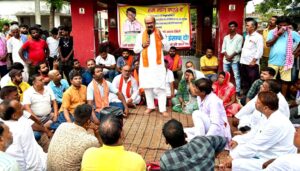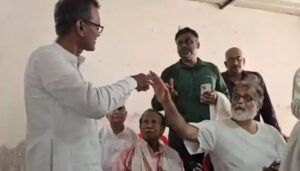
Patna: In Bihar’s storied political theatre, few roles are as powerful—or as enduring—as that of the political patriarch. From Lalu Prasad to Ram Vilas Paswan, the state’s leadership has seen a long tradition of fathers ushering their sons and daughters into politics, building not only legacies, but dynasties. As India marks Father’s Day, the question of political succession and paternal influence remains deeply relevant in Bihar, a state where family often determines one’s future in public life.
At the forefront of this lineage-driven leadership stands Lalu Prasad, widely regarded as the most successful political father in Bihar. Despite facing legal battles and health issues, Lalu has firmly established his political heirs. His younger son, Tejashwi Prasad Yadav, is now the face of the RJD and the Leader of Opposition in the Bihar Assembly. Elder son Tej Pratap Yadav and daughter Misa Bharti, a Rajya Sabha MP, are also active in politics. Rohini Acharya, another daughter, contested the 2024 Lok Sabha elections. Lalu’s ability to launch not just one but multiple children into active political roles has long been a subject of both admiration and criticism. As political strategist Prashant Kishor once quipped, “Lalu Prasad is a good father—he wants all his children to become chief ministers, even if he himself didn’t pass Class IX.”

Late Ram Vilas Paswan, another towering figure in Bihar politics, was no different in nurturing dynastic succession. He brought his son Chirag Paswan from Bollywood into politics after a failed film stint. Today, Chirag is not only the face of the Lok Janshakti Party (Ram Vilas) but also a cabinet minister in Narendra Modi’s government. His swift rise reflects the power of legacy in Bihar’s political calculus.
Late Jagannath Mishra, a former chief minister, was known for grooming his son Nitish Mishra, who currently serves as a minister in the Bihar government. Similarly, the Jitan Ram Manjhi’s son, Santosh Kumar Suman, now leads the Hindustani Awam Morcha and is a cabinet minister in the Nitish Kumar-led government.

However, not every leader has followed this well-trodden path. Chief Minister Nitish Kumar, despite a two-decade-long career at the helm of Bihar and a formidable presence in national politics, has kept his son Nishant Kumar away from the political spotlight. Nishant, like his father, is an engineer by training but has shown no inclination to enter public life. In a state where dynasties are often seen as the norm, Nitish’s stance remains a rare exception.
Still, political inheritance persists across party lines. Shivanand Tiwari’s son, Rahul Tiwari, is a sitting MLA, while Jagdanand Singh’s son, Sudhakar Singh, recently won a Lok Sabha seat from Buxar. Samrat Choudhary, Deputy Chief Minister and a key face of the BJP in Bihar, is the son of former minister Shakuni Choudhary. Ashok Choudhary, another cabinet minister, hails from a political family—his daughter, Shambhavi Choudhary, is a newly elected MP from Samastipur.

Yet, not all political heirs have succeeded. There are also notable cases where family members of prominent leaders never entered politics, even after their patriarchs passed away—former Deputy CM Sushil Kumar Modi’s family, for instance, has stayed away from electoral politics.
Still, the pattern endures. On Father’s Day, Bihar’s corridors of power remain populated by sons and daughters who walk the path paved by their fathers—some propelled by legacy, others burdened by it. Whether through calculated grooming or generational aspiration, Bihar’s political families continue to shape the state’s future, one heir at a time.





